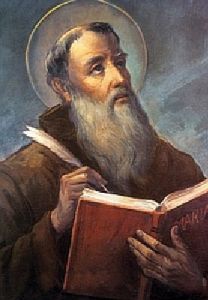|
|
Previous:
St. Apollinaris July 20 Next:
St. Mary Magdalen July 22 St. Lawrence of BrindisiJuly 21 Italian. 1559-1619
Italian. 1559-1619Son of Guglielmo de Rossi and Elisabetta Masella. He felt an early call to religious life, and was educated by the Friars Minor Conventuals of Brindisi, Italy. His father died when the boy was twelve. Studied in Venice. Joined the Capuchin Friars in 1575 at age 16, taking the name Brother Lorenzo. Studied theology, the Bible, French, German, Greek, Spanish, Syriac, and Hebrew at the University of Padua; he was a brilliant student, known for his facility with languages. Priest. Taught theology. Served as linguist and military chaplain. Famous, effective and forceful preacher in any of his several languages. Founded convents of Vienna and Graz in Austria, and in Prague, Czech Republic. Wrote catechisms. Chaplain of the army of the Holy Roman Empire in 1601. Rallied the German princes to fight a superior Turkish force, and was asked to lead the army into battle at Stuhlweissenburg (modern Hungary) carrying no weapon but a crucifix; the Turks were completely defeated. Master general of his order from 1602 to 1605; he was the choice for another term, but turned it down. Carried out important and successful diplomatic peace missions to Munich, Germany and Madrid, Spain. Assigned in 1605 to evangelize in Germany, where he had great success. Convinced Philip III of Spain to join the German Catholic League. Commissary general of his order for the provinces of Tyrol and Bavaria in Germany. Spiritual director of the Bavarian army. Tended to fall into ecstasies when celebrating Mass. In 1956, the Capuchin Order compiled fifteen volumes of his sermons, letters and writings. Proclaimed Apostolic Doctor of the Church by Pope John XXIII in 1959. "God is love, and all his operations proceed from love. Once he wills to manifest that goodness by sharing his love outside himself, then the Incarnation becomes the supreme manifestation of his goodness and love and glory. So, Christ was intended before all other creatures and for his own sake. For him all things were created and to him all things must be subject, and God loves all creatures in and because of Christ. Christ is the first-born of every creature, and the whole of humanity as well as the created world finds its foundation and meaning in him. Moreover, this would have been the case even if Adam had not sinned." - St. Lawrence of Brindisi St. Lawrence of Brindisi, pray for us! View All Saints |




